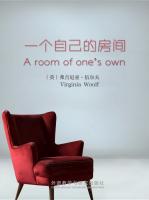lnner freedom
用户823561
Virginia Woolf’s *A Room of One’s Own* transcends its iconic feminist
thesis to reveal a profound spiritual truth: creative sovereignty begins
with carving out sacred mental space. Her demand for "a room of
one’s own and five hundred a year" is not merely practical but
metaphysical—an invocation for the psychological sanctuary where the
self dissolves into pure potential. Woolf understood what Daoist sages
and Chan masters taught: only in stillness, freed from society’s noise
and ego’s constraints, can insight ignite. Her call resonates with
Eastern philosophy’s emphasis on *wu wei* (effortless action) and *xin
zhai* (fasting the heart-mind). The "room" symbolizes the
inner void (*xu*) where thoughts settle like sediment, allowing clarity
to surface. When Woolf describes Shakespeare’s androgynous mind as
"incandescent, unimpeded," she echoes Chan’s ideal of *wu
nian* (no-thought)—a consciousness unclouded by identity or dogma. Here,
creativity becomes meditation: the writer, like a monk in zazen,
achieves liberation not by accumulating but by *releasing*—gender,
expectation, even the self. Woolf’s genius lies in framing material
necessity as spiritual discipline. Financial independence buys not
luxury but *silence*—the emptiness in which the "world seen without
a self" (as she writes elsewhere) can finally breathe. This book is
a manifesto for the artist’s inner monastery: a call to cultivate
solitude until the walls between mind and universe collapse, and
creation flows like water. Five centuries after Zen ink painters
captured mountains in single strokes, Woolf reminds us: all transcendent
art is born in the room where we vanish.



 京公网安备 11010802032529号
京公网安备 11010802032529号